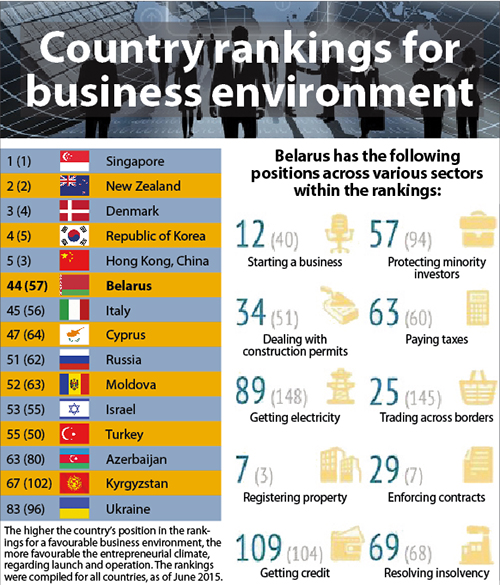The World Bank has released its annual Doing Business report, in which Belarus has moved upwards not by leaps and bounds but, certainly, to some extent. Our country has risen 13 points, from 57th place to 44th. However, last year’s report has also been updated since being originally released, across 10 indices (due to changing methodology). In line with the updated report for 2014, Belarus was ranked 43rd. Accordingly, it appears that we have dropped a place rather than rising! Nevertheless, Belarus is ahead of fellow CIS member states Russia, Moldova, Azerbaijan, Ukraine and Tajikistan.

We’ve made a breakthrough across several positions. In particular, our country has moved from 40th place to 12th for ‘Complexity of New Business Registration’ while ‘Dealing with construction permits’ has shifted from 51st place to 34th. We’ve also managed to considerably improve our position in the nomination for ‘Getting electricity’, having occupied the lowest places for several years. According to the Energy Ministry, in this year’s ranking, Belarus has moved from its previous 148th place to 89th. Deputy Chief Engineer of Belenergo Association, Valery Porshnev, is convinced that, next year, we’ll manage to improve further, since WB experts will be able to take into account improvements made this year. It’s also expected that businesses will work alongside energy specialists to solve certain issues.
“We’ve created all conditions for technological connection and have released Decree #397, enabling us to perform a range of services from one application. Many entrepreneurs still prefer the old scheme but then ‘go off the rails’ and return, to be connected. Probably, they are embarrassed by the financial issue.”
Other flies exist in the ointment, with some improvements worsening other aspects. Compared to last year, the situation has worsened over several parameters: ‘Getting credit’, ‘Paying taxes’, and ‘Enforcing contracts’. The Economy Ministry doesn’t conceal that, despite having improved some areas, potential for business development remains huge.
The Honorary Chairman of the Business Association of Entrepreneurs and Employers (named after Kunyavsky), Georgy Badei, agrees, noting that some negative factors are preventing the country from moving forward. He tells us, “Despite our improvements in some spheres vital to business, several principal problems remain unsolved. Firstly, the fiscal burden on business remains high. Under more stable conditions, this would be less noticeable, but the world market is in turbulence, which can’t but affect us. Enterprises have fewer available assets while loans are expensive. Secondly, stiff tax policies are alarming. The simplified tax system has proven efficient so I don’t know why we need to be restrictive.”
According to experts, another negative factor is reduced support for businesses, due to programmes focusing on small and medium-sized entrepreneurship. Previously, the average annual sum of business support (across all regions) reached Br200bn; in the first half of this year, 10 times less was spent.
Attitudes may vary towards the ratings, with some countries ignoring the Doing Business report. Last year, an independent committee set up by the World Bank to monitor the importance of the Doing Business report announced that its relevance and impact may not warrant the effort. Nevertheless, for many, the assessment remains important. Russia’s President, Vladimir Putin, has tasked his government with reaching the top twenty by 2018. Our goal is slightly less ambitious, aiming to reach 30th position: a goal not far off.
By Evgeny Velikhov











